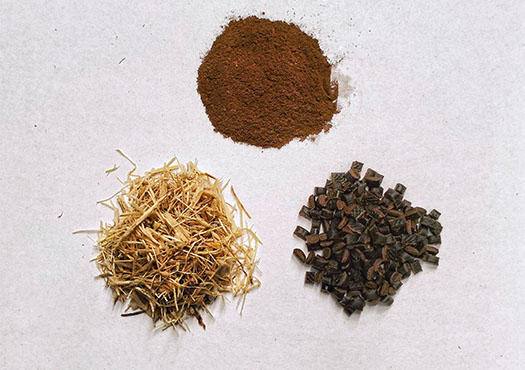Using lignins from the waste material of bioethanol refineries


Industrial by-products containing lignin
Lignin is a complex three-dimensional biopolymer that is the second most abundant biopolymer in nature after cellulose. In higher plants, it accounts for a large proportion of the cell wall and provides structural integrity and hydrophobic properties. Generally, lignin is an unwanted by-product of the pulp and paper industry, as it compromises the quality and purity of the cellulose fibers required to produce paper and paperboard. Despite its low price and the fact that it is readily available, lignin is usually burned. High-quality, scaled-up applications for lignin are yet to be identified.
In addition to the pulp and paper industry, lignin is the largest by-product from second-generation (2G) ethanol biorefineries that produce bioethanol from agricultural waste materials such as sugarcane bagasse and straw which do not compete with food products. The structural carbohydrates of such plants are hydrolyzed and fermented to form ethanol while the lignin is left behind as a by-product.
Growing need for bio-based thermoplastics
The overwhelming majority of the thermoplastics used worldwide are based on petroleum. Yet these have significant disadvantages compared with bio-based plastics. Indeed, when non-renewable fossil resources are used to create plastics, disposing of them and the associated environmental pollution in particular causes huge problems. The use of bioplastics is a highly promising approach; however, the raw materials used should not be in competition with food for human or animal consumption.
Demand for bio-based thermoplastics is growing, driven by consumers who are increasingly environmentally conscious as well as the net-zero goals being pursued by governments which require consumer-oriented product companies to take sustainable approaches. At the same time, the increasing volatility in the oil and gas sector is prompting the traditional players in the petrochemicals industry to move away from their fossil-resource-based products and seek out new and more resilient sources to ensure future earnings and growth. By-products such as lignin from 2G ethanol biorefineries are the most promising resources when it comes to achieving a transformation in the bioeconomy.
From sugarcane residue containing lignin to bioplastics
The SugarUP project is aiming to find a higher-quality application for lignin from 2G ethanol biorefineries, while also tackling the problem surrounding the consumption of petroleum-based plastics. Lignin consists of repeating phenylpropanoid monomers which form a complex network of polymer chains. This structure is very rigid and resistant. Once the lignin-rich side stream has been pre-treated, the mobility of the polymer chains is to be increased by means of an appropriate modification to enable it to be processed into bio-based materials with thermoplastic properties.
The project consortium brings together multidisciplinary expertise from Germany and Brazil, without which an important and purposeful contribution to the progress of the bioeconomy would not be possible.
Project term: |
2020 to 2023 |
Project management |
Forschungszentrum Jülich / Federal Ministry of Education and Research (BMBF) - promoted within the framework of the national bioeconomy strategy "Bioeconomy International 2018" |
Project partners: |
|
 Fraunhofer Institute for Process Engineering and Packaging IVV
Fraunhofer Institute for Process Engineering and Packaging IVV